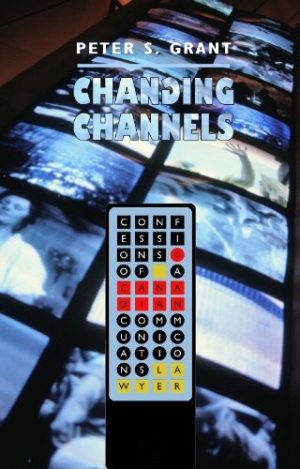Changing Channels
Confessions of a Canadian Communications Lawyer
Grant’s experience tells the story of how Canada entered the age of modern media.
In Changing Channels: Confessions of a Canadian Communications Lawyer, Peter S. Grant takes readers through his life story with a mix of personal autobiography and professional memoir. While many of the cases are covered a bit quickly, the book does a solid job of showing the diversity of cases Grant handled and presents a good overview of Canadian media.
Roughly the first third of the book is devoted to Grant’s background, from childhood through university, providing more of a general overview of the author than a setup for the career-focused stories that make up the remaining chapters. The table of contents alone demonstrates that Grant has had an impressive career in communications law, taking part in a number of decisions that modernized media in Canada and brought Canadian television viewers a much greater variety of programming. There’s much to be learned in the work-related chapters, and there’s a fascinating diversity to the applications and cases to which Grant applied his expertise.
Some of the chapters on Grant’s career could use more of an anecdotal approach. When writing about most of the cases, he does a good job explaining the issue and the goals of each party involved, as well as the final decision that ultimately resolved the issue. That works well as a primer on each issue, but because Grant has worked on some truly interesting cases, it would be nice to have at least a handful of chapters that get more in depth with the how and why behind a particular result.
For example, Grant relates a case in which Disney wanted to break into the Canadian market with a channel similar to its US version. He worked on creating a proposal for a family channel that would incorporate Disney content along with Canadian programming, while another company was also crafting a family programming proposal. He explains that the second company “retaliated with a hastily drafted blast at the Family Channel application, arguing that it was really controlled by Disney. In the end, the commission granted both applications. Since then, both services have prospered.” In situations like this, the resolutions often feel swiftly explained, compared to the various interesting complications raised at the outset.
Still, Changing Channels makes for a good read because of the breadth of Grant’s experience. Whether arbitrating disputes between political parties, helping launch a Canadian drama channel, or helping bring Canadian versions of popular US channels like MTV or the Disney Channel to Canada, Grant has been an important player in his field and one with many interesting stories to share.
Reviewed by
Jeff Fleischer
Disclosure: This article is not an endorsement, but a review. The publisher of this book provided free copies of the book and paid a small fee to have their book reviewed by a professional reviewer. Foreword Reviews and Clarion Reviews make no guarantee that the publisher will receive a positive review. Foreword Magazine, Inc. is disclosing this in accordance with the Federal Trade Commission’s 16 CFR, Part 255.

